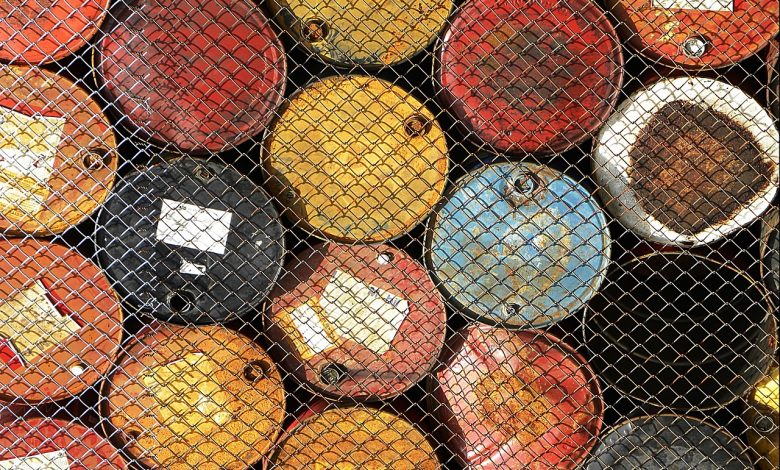Can Europe manage if Russian oil and coal are cut off?
USA and UK have already ordered the stop to oil and coal from Russia
(Sustainabilityenvironment.com) – Europe is gearing up to overcome the coming winter even if Russian oil and coal are cut off. But can you say goodbye quickly to the coal and oil of Moscow? So far the 27 have held back on this hypothesis and have not followed the United States and Great Britain in the embargo on all hydrocarbons announced last week. Yet it can be done, say the analysts of the economic think tank Bruegel.
Not for free, of course: the transition period will be “short and painful“, they warn. But if well managed, the stop to oil and coal from Russia will cause only temporary problems.
In terms of energy security, Brussels reacted to the Russian invasion of Ukraine with a new strategy, the REPowerEU plan, which focuses mainly on gas, energy efficiency and renewables. Dependence on Moscow gas (about 45% of annual imports) is the EU’s real problem, but imports of oil (30%) and coal (as much as 50% of the total) also weigh. While the EU aims to do away with Russian gas to a large extent by the end of 2022, coal and crude oil are ahead of the game by 2030. How can Europe afford more drastic choices and say no to oil and coal from Russia?
How to say goodbye to Moscow oil?
In principle, blocking oil imports from Russia could be easier than closing the door to Moscow’s gas. Most of Russia’s crude oil imports, in fact, take place by the sea and not pipeline. Replacing it would be easier.
But there are bottlenecks. Firstly, the European pipeline infrastructure for crude oil is built to carry oil from east to west, not vice versa. Getting fuel to Eastern Europe requires transport by road, rail or river.
Secondly, refineries: a large proportion of EU refineries are calibrated to the quality of Russian oil and would be less efficient with other types of crude oil. The most vulnerable are 6 structures in Poland, Germany, the Czech Republic, Austria, Hungary and Slovakia, along the Druzhba pipeline.
Thirdly, in addition to replacing Russian crude oil, there is also the refining capacity of Moscow, from which the EU obtains diesel, fuel oil and naphtha. The European capacity would suffice, but the EU refineries would have to work at 90% (15-16 million barrels per day), a share never reached for 20 years.
We must also add the difficulty of finding supplier countries willing to increase production in order to make up for Europe’s shortcomings. OPEC could theoretically exploit a spare capacity of 4 million barrels per day (including Iran in case of a nuclear agreement and an end to the Tehran oil embargo). But the exporting countries have shown all their reluctance to play this card. Not least because they have agreements with Russia, in the Opec+ format, to independently manage an important share of the global oil market. The US should be able to recover another 1.5 million barrels lost at the start of the pandemic with shale. As many could come from the spare capacity of other countries in the OECD area.
Conclusion: for Bruegel analysts, the stop to Russian oil is possible but provided that Europe also focuses on a reduction in domestic demand. And it should change its approach: no more subsidies to the categories most affected by the increase in the price of the barrel, because in the long run they will make prices rise even more.
“The focus should be on proactive cutting rather than increasing demand. This will calm markets and allow supply and demand to meet at a more reasonable price,” analysts say. Especially through measures to reduce private transport, promote public, collective, and car-sharing.
A stop to Russian coal
If the consumption and domestic production of hard coal (anthracite) has fallen in Europe in recent decades, the import is growing: it has increased from 30 to 60% of the need. The quantity supplied by Russia increased from 8 to 43 million tonnes between 1990 and 2020. As a percentage, it increased from 7% to 54%. On lignite, the EU is self-sufficient. The most vulnerable category is thermal coal (we take 70% from Russia) while the metallurgical one is less linked to Moscow (20-30%).
In addition to dependence, there is another difficulty: saying goodbye to Russian coal while cutting other fossil fuels is a double challenge. European coal-fired power plants are expected to increase output to fill the electricity deficit from gas. And thus import more coal.
But there is good news: the global coal market is flexible enough to allow the EU to quickly replace imports from Russia. “It was only Russia’s aggressive push in the past decade for market share in the EU that pushed out other suppliers“, Bruegel researchers explain. And theoretically, countries that have recently reduced their coal supplies to Europe can increase them in a short time. Indonesia, Colombia, Australia, South Africa and the United States are the countries to look at.
“While stopping Russian gas imports would be difficult and costly, but feasible, it will likely be less painful for the EU to manage a complete interruption of Russian oil and coal imports”, Bruegel’s researchers conclude.
“Oil and coal are more global and liquid markets than gas, and rely less on rigid infrastructure like Europe’s gas import pipelines. However, this implies that a European halt to Russian oil and coal supplies would have substantial global second-round effects. Europe might be hit hard by higher prices, but being a wealthy continent would be able to attract more crude oil, oil products and coal, which might be increasingly difficult for emerging and developing economies”.






